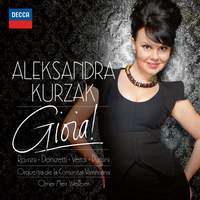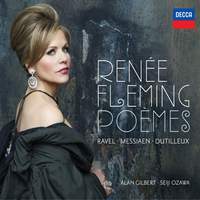Recording of the Week,
Aleksandra Kurzak and Renée Fleming
I’ve got two very different recital programmes from two very different sopranos to tell you about this week. Both ladies come to us courtesy of Decca and both are currently celebrated Violettas, but there could scarcely be more contrast in terms of their instruments or repertoire choices: one is a relative newcomer laying her cards on the table with a glittering selection of operatic favourites; the other is venturing into more esoteric waters as she approaches the autumn of a stellar international career.

First up is a recital debut disc from a young Polish soprano, Aleksandra Kurzak, who’s making quite an impact in the world’s major opera houses of late. From the glimpse we get of her sensual, witty Susanna on this disc it’s easy to see why: every ounce of the feline charm which is currently bewitching audiences and critics at the Royal Opera House comes across on record, and she’s as compelling in the simple phrases of Deh, vieni as she is in the bravura showpieces which dominate the rest of the disc. Her diamantine soprano sits so high that it actually confused my sense of pitch on several occasions (‘surely that can’t have been a high D?!’) but there’s not so much as a hint of shrillness even at the very top of the voice: her warm middle register has a mellowness and body which isn’t normally associated with coloratura sopranos and she never lapses into the generic arch mannerisms which can sometimes creep into these roles (listen to her warm, sincere O mio babbino caro to hear these virtues to best effect).
This disc is effectively a portfolio of all the great display pieces for this voice type (Adina, Musetta, Violetta, Lucia and Gilda all feature). It’s a box of (familiar) delights, chiefly because each aria is so deftly characterised and because Kurzak simply exudes such joy from beginning to end. (Apparently the title ‘Gioia’ was suggested by her agent, who remarked that he could see the joy in her face each time she sang, and you can certainly hear it in every phrase!) Every item fits her supple, full-bodied instrument like a glove, but the stand-outs for me were her deliciously impertinent Adele (you can sense her every gleeful reaction to the befuddled Eisenstein as she teases him at the masked ball); a vulnerable, volatile Violetta; and the utterly exhilarating cabaletta from Lucia di Lammermoor, despatched with such tangible exultation in the act of singing that it brought a lump to my throat even after three hearings.

From a singer in the early stage of her recording career, we move on to one of the current grande dames of sopranos, in a demanding programme of twentieth-century French orchestral song cycles. Renée Fleming’s extensive discography to date has focused more on operatic repertoire than song, and though she writes enthusiastically about her affinity with the language in the booklet note, she’s recorded relatively little French music (her opulent Thaïs being a notable exception).
The real curiosity here is the premiere recording of Dutilleux’s Le temps l’horloge, which sets texts by three poets on the theme of time and makes ingenious use of accordion and harpsichord. The cycle was written especially for Fleming and its soaring, often angular lines do indeed sound made-to-measure. I must admit that I was a little surprised when I first heard that the disc was to include Ravel’s Shéhérazade, more commonly recorded by mezzos, and Messiaen’s formidable Poemes pour Mi, usually the province of bigger, more dramatic voices than Fleming’s lush lyric soprano. But it all works beautifully – the voluptuous Ravel songs (underpinned by some fantastically atmospheric orchestral playing) showcase smoky, almost mezzo-ish tints which I hadn’t heard from this singer before, and the powerhouse Messiaen songs are delivered without a hint of strain at either extreme of their large dynamic and tonal range.
Fleming mentions in the booklet note that she herself was rather surprised when conductor Alan Gilbert suggested the Messiaen, and describes how they worked together to play up the translucency of the music so as not to overwhelm her essentially soft-grained instrument. Not that there’s any resultant lack of drama: the big climaxes come off thrillingly, and she musters some real bite in the lower reaches, especially in the nightmarish visions of the fourth song Epouvante. My only reservation is that it’s almost too beautiful in places. Fleming is seemingly incapable of making an ugly sound, and some of the visceral horror of the poetry is smoothed away as a result.
Interestingly, the Ravel and Messiaen were recorded only last year, two years after the Dutilleux, and the later recordings show more amplitude and colours in the middle register: it seems that one of the most celebrated soprano voices of today is still developing in new and exciting directions! Perhaps both of these discs represent the start of something new…
Aleksandra Kurzak (soprano), Francesco Demuro (tenor), Orchestra de la Comunitat Valenciana, Omer Meir Wellber
Available Formats: MP3, FLAC
Renée Fleming (soprano), Orchestre National de France, Seiji Ozawa, Orchestre Philharmonique de Radio France, Alan Gilbert
Available Formats: MP3, FLAC




